 |
 |
|
What do think of when you hear the word "Cuba". If you
are like many people, you think of Castro, communism, the Cuban missle crisis,
the bay of pigs, refugees fleeing on makeshift rafts to Miami. Or maybe you remember
the Pope's recent visit to the island.
Well it's been 4 years since I traveled to Cuba, yet there are many things that I still remember about my trip there. |
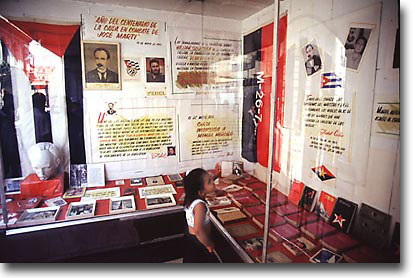 |
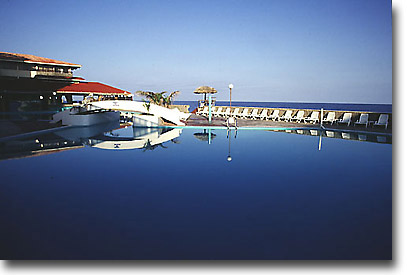 | Now my first instinct was to think, they stole someones publicity images, surely this can't be the same Cuba I've heard about. |
|
Arriving at the Habana airport was not all that different than landing at any other
airport I've been too, except immigration lines were a bit longer and slower.
I was a bit nervous as I was entering as a photojournalist and I had a lot camera equipment and film. I was thinking I should have had someone else carry in a camera a couple lenses and some film just in case. But I entered without too much trouble. My suitcase, however, was the last one to come out of the baggage area. I noticed that the rest of my group were walking out of the airport, so I quickly grabbed my suitcase and tried to catch up with them as fast as I could. I hadn't gotten very far when one of the customs agents stopped me and asked me if that was my suitcase. I've traveled enough to know that usually is not a very good sign when the customs official asks you whether or not the suitcase in your hand is yours or not. He asked me to open it. I really don't like opening my suitcase for customs officials, I tend to pack rather tightly and it's hard to get everything back in. Besides that, half of my suitcase was full of powdered milk, food, clothing and other items that we were going to give away. |
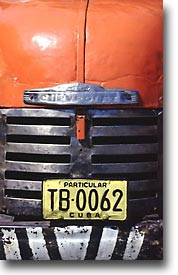 |
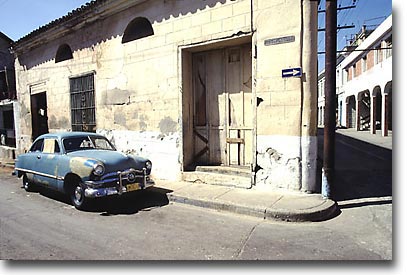
|
Actually he really wasn't interested in those items. It was the Marantz pro tape recorder to record interviews, a battery charger
and a metz flash that he wanted to see.
Well, the customs agent looked each item over carefully and then thanked me for waiting and said I could go. He added that the x-ray operator thought I had a bomb in my suitcase so they had to check it out. |
| We spent our first night in the Copacabana hotel. The hotel was quite nice and I was a bit surprised to discover that we had CNN and cable tv in our rooms. I soon discovered why we hadn't exchanged money for Cuban pesos. The US dollar is the only currency that allows you to eat, sleep, buy gasoline, a can of Coca Cola or anything else you want in the country. The Peso is essentially worthless to the tourist. |
 |
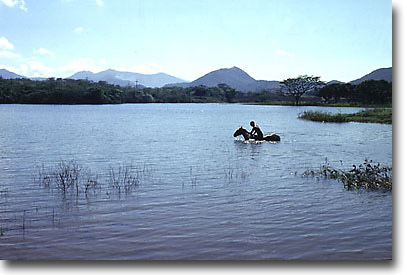 |
My Cuban hosts from the start, very carefully informed me of things I shouldn't photograph. High on the list of course were lines for food, empty shelves in stores and anything military.
When ever I travel, I use any available free time to get out and look for photo opportunities. I was staying at the same place for several days and had explored about all I could on foot. I had a free afternoon, so I borrowed an old Chinese-made bicycle and headed off into the hills |
|
I traveled across the country side, taking a few shots here and there until suddenly I realized I had a flat tire. I looked up ahead and saw an asphalt road. I figured I could probably hitch a ride back so I went up to road. In Cuba there isn't a lot of traffic on the roads, public transportation consists of hitching a ride on the back of a truck. So rather than wait around I thought I would start walking. |
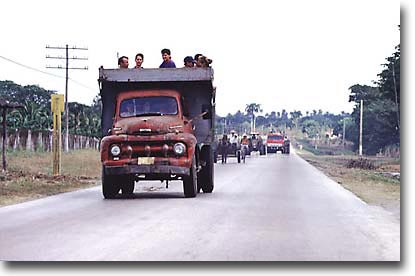 |
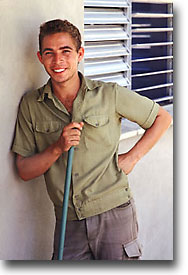 |
I had walked for about 1/2 hour when I looked to my left and suddenly saw an old car, some stone walls and figures of people made out of cement. I looked to the right and saw barracks.
It didn't take long to realize that the road had led me right
into the middle of a military training base. By this time however, there were uniforms walking back and forth all around me.
To make matters slightly more uneasy was the fact that over my shoulder was my F-1fn and the 80-200 zoom with a hood that makes it look suitable for surveilance work. I saw a group of officers heading my direction with a very questioning expression on their faces. I figured I couldn't turn around now so I walked towards them, greeted them, told them where I was staying and asked where I could get the flat tire fixed. I'm glad God gave me an honest face and the ability to speak Spanish, as they smiled and pointed me down the road. I joke now that I really blew a great opportunity to ask if I could photograph Cuban soldiers doing training exercises. But at the time, I was more concerned about leaving the base with my camera, lenses and film intact. |
|
I found many things to photograph and many more that I would have loved to stop and photograph but my schedule did not allow it.
There are parks and monuments to Marti, Che, Castro and the revolution literally everywhere. |
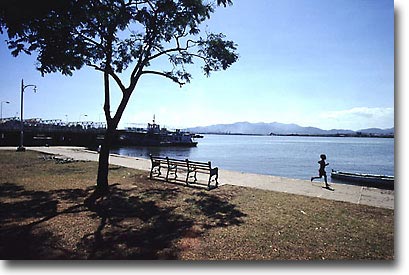 |
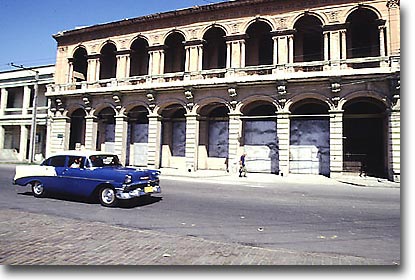 |
There are lots of old cars from the 40's and 50's that are still in use. Most look great from a distance, but show their age up close. We also discovered that there aren't many original parts left in the classic cars. Many have had the motor and transmission replaced with parts from former Soviet-bloc made Ladas. |
|
Cuba has several old Spanish forts that are worth seeing. I enjoyed a brief visit to the fort near Santiago de Cuba. I shot both black and white and slides and found
it really worked better for my tastes in black and white. I would have loved to have had a tripod and another hour or two to explore it a bit more.
There is a lighthouse and a restaraunt right next to the fort. We were able to go up into the lighthouse to see the inner workings of it. I was a bit surprised to see that they had constructed the fresnel type lenses out of a series of curved triangular bars of glass with air spacing in between. The bulb was only like 25 watts or something like that. Unfortunately, I did not have any free time to visit the sites in Habana itself. But anywhere you go, people will come up to you and try to sell you one thing or another. I would reccomend as a photographer that you try to walk around with someone else who can divert the venders and distractions elsewhere as well as help keep an eye on your equipment. |
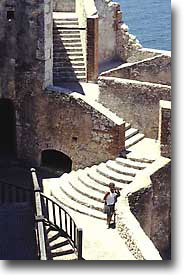 |
|
I heard a joke the other day that more or less sums up how many Cubans feel about their country's situation: A school teacher asked her class if anyone knew who the first communist was.
A little girl shouted out that it was Adam and Eve. The teacher was a bit surprised by that,
so she asked the student to explain her answer. The little girl responded that Adam and Eve, had no home, had no clothes, had no money and yet people still say they were living in paradise.
|
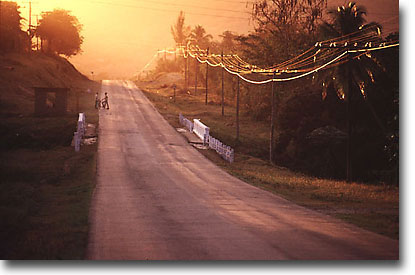 |
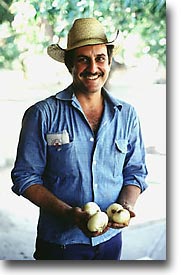 |
As a tourist destination for foreigners, Cuba has a lot to offer. They have wonderful beach front resorts and 4 and 5 star hotels that were built and are operated by various international companies.
There are many colorful subjects and I saw many interesting photo opportunities.
But the tourism experience is vastly different from the day to day economic realities and living situations of the average Cuban citizen. When I was in Cuba the average monthly wage was US $ 3.00. In fact a farmer's daily wage would enable him to buy just four onions. As I look back on my two weeks in Cuba, I am reminded how blessed I am to have been born where I was. I met people who had no hope and were willing to risk death at sea on some makeshift raft to escape. In some ways it's understandable. I met highly intelligent univeristy professors and medical doctors whose monthly wages were only U.S. $10. It would be hard for me to me to be happy while earning only $10 a month. Yet, believe it or not, I met professors and doctors who were happy and others who were earning far less. |
|
What was the secret of their happiness?
It wasn't a firm belief in communism or faith in their leaders. Instead they have a faith and an eternal hope that has allowed them to endure years of hardships and suffering. They have faith in Jesus Christ. They know a God who answers their prayers and miraculously provides for their needs. One Cuban I talked with put it best, "without God, there is no hope for Cuba or the rest of the world". |
 |